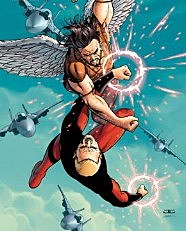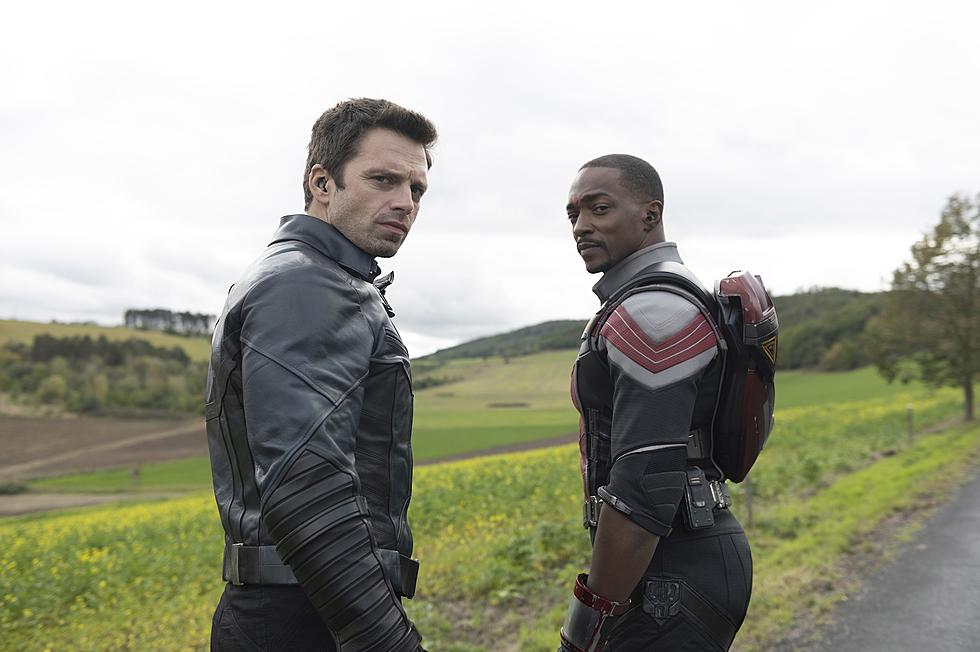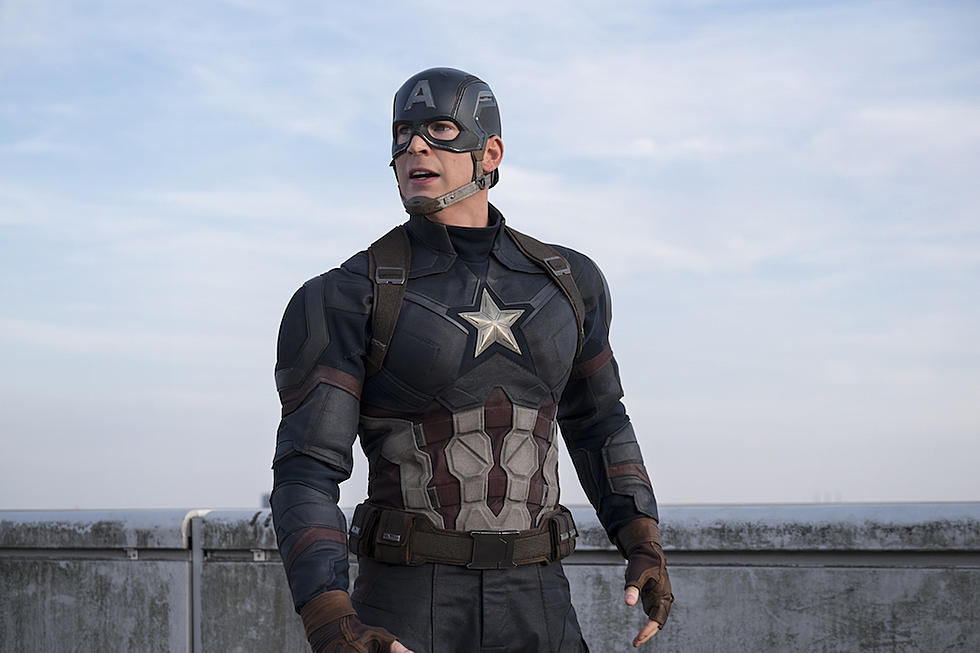
Hot Ink: Cap Reborn, Marvel Divas, Irredeemable
ComicsAlliance runs down the biggest -- and best -- books of the week.
OLD SOLDIERS NEVER DIE IN - Captain America Reborn #1.
 At some point in time the idea of a superhero coming back from the dead will be so commonplace that when it occurs, the character's resurrection will be noted in a panel or two, in which they will walk in, sit down on a couch, and receive subdued nods of greeting from their friends and loved ones. For the moment we're all still pretending it's so surprising that it calls for a multiple-issue long miniseries.
At some point in time the idea of a superhero coming back from the dead will be so commonplace that when it occurs, the character's resurrection will be noted in a panel or two, in which they will walk in, sit down on a couch, and receive subdued nods of greeting from their friends and loved ones. For the moment we're all still pretending it's so surprising that it calls for a multiple-issue long miniseries.
In the case of Captain America, that series remains in the hands of writer Ed Brubaker, whose run dating back to 2005 has seen the return of Bucky, Steve Rogers' death, and his eventual replacement by Bucky as the new Captain America.
With Steve now returning a little more than two years later, Brubaker is once more taking on a storyline guaranteed to make dedicated readers of the character throw up their hands in exasperation, become consumed by fan-rage, and begin angry rants with "But how can they . . ." before trailing off into incoherent stuttering protestations. And this time around he'll also have to deal with new fans who've grown attached to his portrayal of Bucky as the new Cap, and are probably worried that this will all end in the character Brubaker so carefully developed reverting back to a benchwarmer.So at this point you're probably wondering how the first issue of the miniseries stacks up. Well, to be honest, it reads like it could be the lead-in issue in the regular series that sets the stage for the miniseries. There's a lot of catching up for readers who may not have been following the series since Steve Rogers died and introductions to all the players involved, but Steve himself doesn't make much of an appearance at all until near the end of the issue.
I won't spoil how he comes back, but I'll give you this hint: if you make a Venn diagram of plot devices used by Kurt Vonnegut and J. Michael Straczynski, the answer's going to be located somewhere in the intersection. The pieces are all set for the real story to kick off with the second issue of Reborn, but with only five issues in the series I kind of wished they'd hurried to the main story a little quicker.
COMING TO TERMS WITH MY FEELINGS FOR - Marvel Divas #1
 I have never watched an episode of "Sex in the City" in my life, and for that reason I may not be the target demographic for this book. I feel no particular pride or shame in that statement, but it is true and something I feel should point out before I pass judgment on Marvel's new four issue series detailing the attempted ordinary lives of superheroes Patsy Walker, Angelica Jones, Felicia Hardy and Monica Rambeau. Honestly, I went into this book not really expecting to like it, and it surprised me. What I'm not entirely sure about at this point is exactly how it surprised me.
I have never watched an episode of "Sex in the City" in my life, and for that reason I may not be the target demographic for this book. I feel no particular pride or shame in that statement, but it is true and something I feel should point out before I pass judgment on Marvel's new four issue series detailing the attempted ordinary lives of superheroes Patsy Walker, Angelica Jones, Felicia Hardy and Monica Rambeau. Honestly, I went into this book not really expecting to like it, and it surprised me. What I'm not entirely sure about at this point is exactly how it surprised me.
First of all, I can happily report that the book does pass the Bechdel Test, which asks that a work of fiction (1) has at least two women in it (2) who talk to each other, (3) about something besides a man. Pages when this can be observed actually happening in Marvel Divas are 1-2, 4-5, 7-8, 15, and 22-23. That totals up to almost forty percent of the book.
I was afraid the characters would perpetuate ridiculous stereotypes about women, but in all honesty the ridiculous stereotypes that pop up in the book tend to be the men. The women are at worst nuanced, sophisticated stereotypes and often they either are or show signs of becoming fully-developed characters growing out from those aforementioned stereotypes. I've always had fun reading books dealing with the ups and downs of living as a B-list or lower superhero, and Divas is able to pull that off surprisingly well.
How can I not be at least somewhat impressed with a comic that contains the line "I don't want him zombifiying me just 'cause I'm not into cuddling" and does so it a way that actually works? What's more, the end of first issue promises that the rest of the series is most certainly going to be more than fun fluff and gossip.
SO MUCH FOR "USE YOUR POWERS ONLY FOR GOOD" - Irredeemable #4
 Jerry Siegel and Joe Shuster's first character named Superman was a villain, and although he had little resemblance in appearance or abilities to the character with the same name that would be the lasting legacy of the two men, the idea's still got an appeal to it. The Superman we know is an icon, sure, but as a hero there's never all that much fear of him failing. His powers are so impressive that there's little chance of anything stopping him -- there's no real tension. But as a villain, he's terrifying, an unstoppable force of destruction. You can't outrun him, and you can't hide. And that's the story Mark Waid's writing in Boom!'s excellent series "Irredeemable," with art by Peter Krause.
Jerry Siegel and Joe Shuster's first character named Superman was a villain, and although he had little resemblance in appearance or abilities to the character with the same name that would be the lasting legacy of the two men, the idea's still got an appeal to it. The Superman we know is an icon, sure, but as a hero there's never all that much fear of him failing. His powers are so impressive that there's little chance of anything stopping him -- there's no real tension. But as a villain, he's terrifying, an unstoppable force of destruction. You can't outrun him, and you can't hide. And that's the story Mark Waid's writing in Boom!'s excellent series "Irredeemable," with art by Peter Krause.
Of course the names, faces and costumes have been changed to protect those involved from a pitchfork and torch wielding mob composed of DC's legal department, but the parallels are clear enough. And Waid, whose past work has always been able to find the emotional core in heroes that both attracts us to them and sometimes makes us uncomfortable, has been doing some of his best work in "Irredeemable."
He imagines an all-powerful being whose never ending battle to protect to the people of Earth combined with his intensely secretive personal life finally causes him to snap and turn on everyone from friends to enemies to innocent bystanders. And the fourth issue provides the clearest picture yet of how hopeless attempting to stop such a man would be. It also continues to give the reader an uncomfortable look into the mind of Waid's Superman analogue, The Plutonian. But what's most disconcerting about these glimpses into the Plutonian's past, shown through the eyes of his friends, is just how well Waid portrays the slow collapse of the world's former greatest hero as it occurs over a period of years, carefully hidden from all those close to him.
There's not much I don't like about the series, but I'll admit to one thing. It forces me to reconsider Superman himself, and I think I've come to view his greatest attribute as not strength or flight or invulnerability, but instead his ability to remain a good man, able to care about and help others no matter what tragedies and temptations he's faced with. And then I have to ask myself, well, what's the explanation for that? Is it nature or nurture? And I'm not happy with either possibility.
Because if it is nature, then that's saying people simply are inherently good or inherently evil from the moment they come into existence and there's nothing that'll change that, a thought which makes me extremely uncomfortable. And if it's nurture, then Superman's origin story is only going to encourage those smug bastards from the Midwest who insist that growing up in a small town out there makes you a better human being. I think I'd rather get my hand burned off by someone with heat vision than hear another lecture about how much more polite everyone is out there.
More From ComicsAlliance









